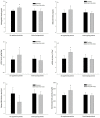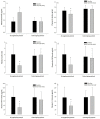Effects of zinc supplementation on plasma copper/zinc ratios, oxidative stress, and immunological status in hemodialysis patients
- PMID: 23289009
- PMCID: PMC3534881
- DOI: 10.7150/ijms.5291
Effects of zinc supplementation on plasma copper/zinc ratios, oxidative stress, and immunological status in hemodialysis patients
Abstract
Background: Patients undergoing hemodialysis (HD) have low plasma levels of zinc (Zn), high plasma levels of copper (Cu), and exhibit increased oxidative stress, inflammation, and immune abnormalities. We evaluated the effects of Zn supplementation on abnormal plasma Cu/Zn ratios and clinical outcomes in HD patients.
Design and methods: Patients on long-term HD with lower than normal plasma concentrations of Zn (< 80 mg/dL) were randomized to receive daily oral Zn supplements (n = 40) or no supplements (n = 25) for eight weeks. Age- and sex-matched healthy individuals served as a control group (n = 38). A number of clinical parameters were measured before and after the supplementation period.
Results: Compared with healthy subjects, patients had significantly elevated plasma Cu concentrations and Cu/Zn ratios, as well as higher levels of oxidative stress and pro-inflammatory cytokines. Patients who received Zn supplements for eight weeks had higher plasma concentrations of Zn and lower concentrations of Cu, along with reduced Cu/Zn ratios, oxidative stress status, and inflammatory responses compared to patients who did not receive Zn. Patients receiving Zn also showed significantly higher percentages of CD4 and CD19 lymphocytes, and elevated CD4/CD8 ratios.
Conclusions: Zn supplementation ameliorates abnormally high plasma Cu/Zn ratios and may reduce oxidative stress, improve inflammatory status, and maintain immune function in patients undergoing long-term HD.
Keywords: copper/zinc ratios; hemodialysis patients.; immune function; inflammation; oxidative stress; zinc supplement.
Conflict of interest statement
Competing interests: The authors do not have any conflicts of interest to declare.
Figures



References
-
- Guo CH, Wang CL, Chen PC. Micronutrient metabolism in hemodialysis patients. In: Maria Goretti Penido, editor. Hemodialysis-different aspects. Croatia: InTech; 2011. pp. 173–204.
-
- Ozen KP, Asci G, Gungor O. et al. Nutritional state alters the association between free triiodothyronine levels and mortality in hemodialysis patients. Am J Nephrol. 2011;33:305–12. - PubMed
-
- Rashidi AA, Salehi M, Piroozmand A, Sagheb MM. Effects of zinc supplementation on serum zinc and C-reactive protein concentrations in hemodialysis patients. J Ren Nutr. 2009;19:475–8. - PubMed
-
- Guo CH, Wang CL, Chen PC, Yang TC. Linkage of some trace elements, peripheral blood lymphocytes, inflammation, and oxidative stress in ESRD patients undergoing either hemodialysis or peritoneal dialysis. Periton Dialysis Int. 2011;31:583–91. - PubMed
-
- Sahin H, Uyanik F, Inanç N, Erdem O. Serum zinc, plasma ghrelin, leptin levels, selected biochemical parameters and nutritional status in malnourished hemodialysis patients. Biol Trace Elem Res. 2009;127:191–9. - PubMed
Publication types
MeSH terms
Substances
LinkOut - more resources
Full Text Sources
Other Literature Sources
Medical
Research Materials

